The abbreviated words “sync” and “synch” both apply when talking about them in the context of computers. However, it appears that one is definitely more popular than the other, and we have the statistics to prove it. In this article, we’ll explore which is best to use.
Sync Or Synch: Which Is Correct?
“Sync” is the correct and most popular spelling for the word. It is short for “synchronize,” which means “happening at the same time.” “Synch” is also a correct abbreviation but is much less commonly used because of how easy it is to confuse with the pronunciation “sinch.”
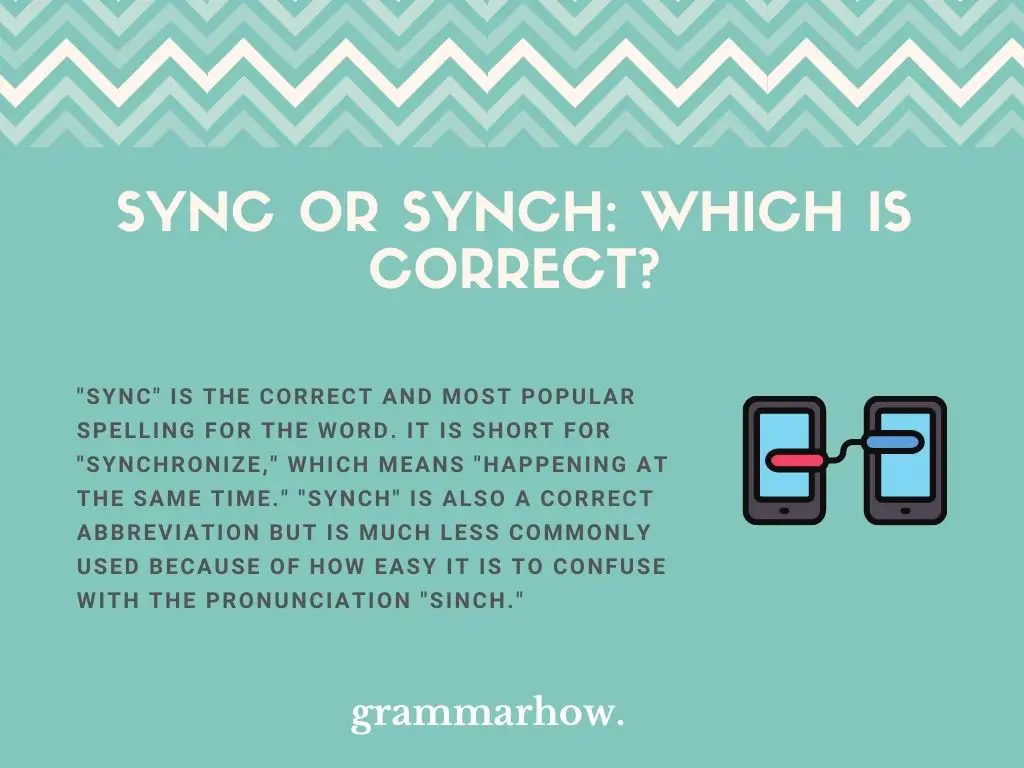
According to The Cambridge Dictionary, “synchronize” means “to (cause to) happen at the same time.” “Sync” is the short-form version of this, while “synch” is an alternative spelling.
We also have a graph that shows you the statistics between the popularity of the two. Here, it’s clear that “sync” is the most popular choice, and it has grown exponentially over the last two decades. It also has been competed with by “synch” since about the 1940s.
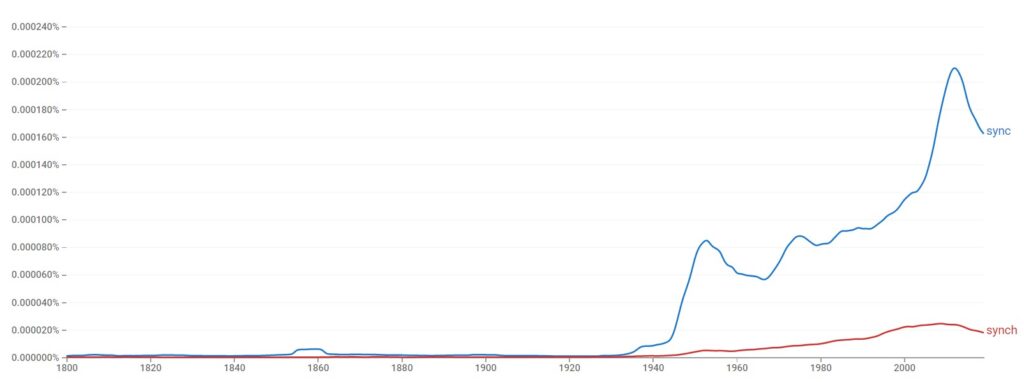
We can also share information from Google to show you just how common “sync” is compared to “synch.” According to Google, “Sync” is mentioned 8,920 times on The New York Times website, while “Synch” is mentioned 1,160 times.
Is It Sync Or Synch AP Style?
According to the AP Stylebook, the correct version for the abbreviation of “synchronize” is “synch.” This contradicts the most popular word of the two.
AP Stylebook says that the abbreviated form of “synchronize” is “synch” because it keeps the original root of the word.
However, “synch” is still pronounced like “sink,” which is part of the reason why so many people prefer using “sync” in the first place since the “H” letter can be confusing to pronounce.
Does The Preferred Choice Of Sync Vs Synch Differ In American English And British English?
We can also take a look at the differences between American English and British English. Sometimes, the two languages have quite apparent language changes. This time, it doesn’t seem to be the case.
According to this graph, American English follows the same general patterns as we showed above. “Sync” is the most popular choice of the two and has rapidly grown as we move into the 2000s.
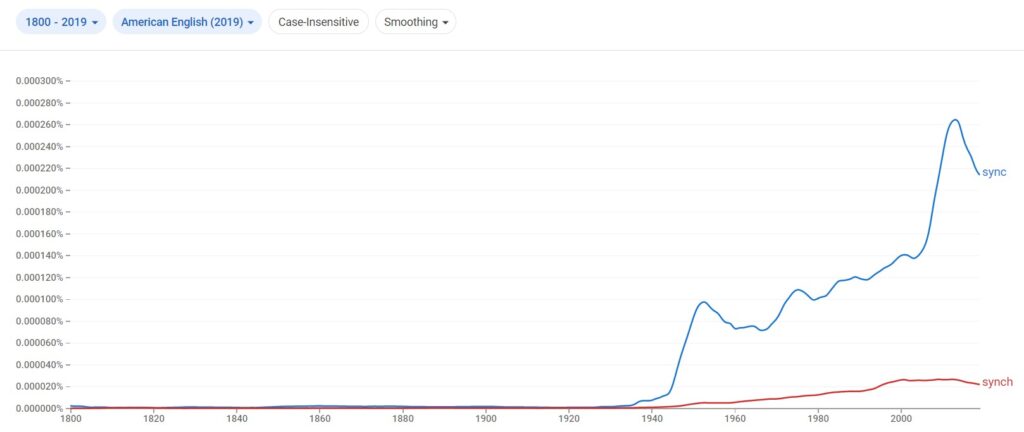
We can also see this graph with British English usage. This time, it’s clear that the trend line is different (due to fewer recorded results in British English); however, the end result is the same. “Sync” is still the most popular choice for spelling.
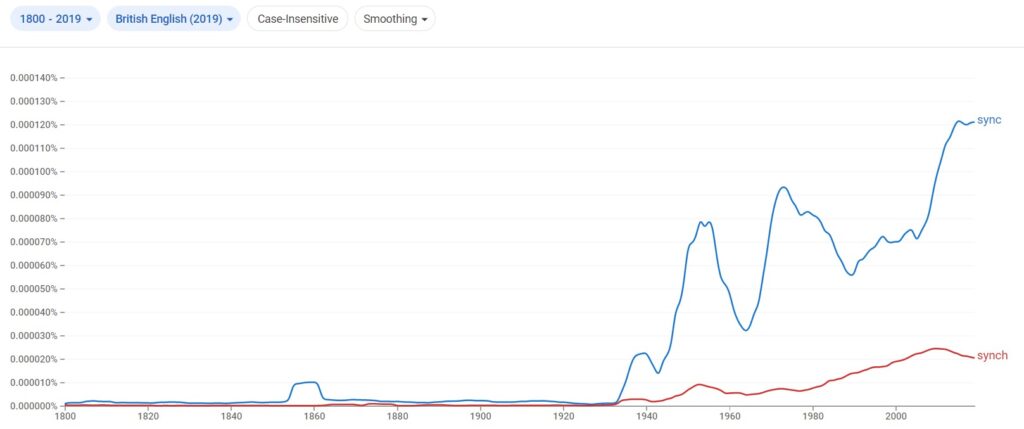
Also, in favor of how common “sync” is compared to “synch” in British English, we referred to the BBC News website. According to Google, “Sync” is mentioned 3,670 times on BBC’s website, while “Synch” is mentioned 810 times.
Meaning Of “Sync” And “Synch”
So, we know what the correct spelling of the word is (incidentally, they’re both correct, we just prefer “sync”). Now let’s talk about the meaning.
“Sync” is a shortened form of “synchronize.” It’s most commonly used in computer language to talk about two or more things happening at the same time. It can also be used more generally to talk about things happening together.
- We made sure to sync the updates on the hard drive.
- We synched the downloads with each other.
- We made sure to sync everything that we could before it was too late.
- We looked into synching the information across the website.
- I need to sync these up with each other.
- Can you synch these if I paid you?
- Do you want to have a lip-sync battle with me?
- We should synch our messages to confuse everyone who calls us.
- I need to find somewhere to sync my data to the cloud.
- Are you able to synch this?
We included both spelling variations to show you that they’re both correct. It’s important to remember this because it doesn’t affect our overall language skills or abilities.
However, if you want to stick to what’s popular, “sync” is the best choice. Generally, you’ll want to stick to the more popular words and phrases in English. This encourages more people to understand what you’re writing without any need for clarification.
Remember, the main reason we use “sync” over “synch” is because it looks easier to pronounce and is closer to “sink” (which is how you pronounce it). Adding “H” to the end to make “synch” makes some people read it as “sinch,” which is wrong.
Is It Spelled Synced Or Synched?
No matter what form we’re using when it comes to saying “sync,” we still typically follow the same spelling rules.
“Sync” is a verb, so we can use it in the past tense “synced” or “synched” to say that we’ve made two or more things happen at the same time.
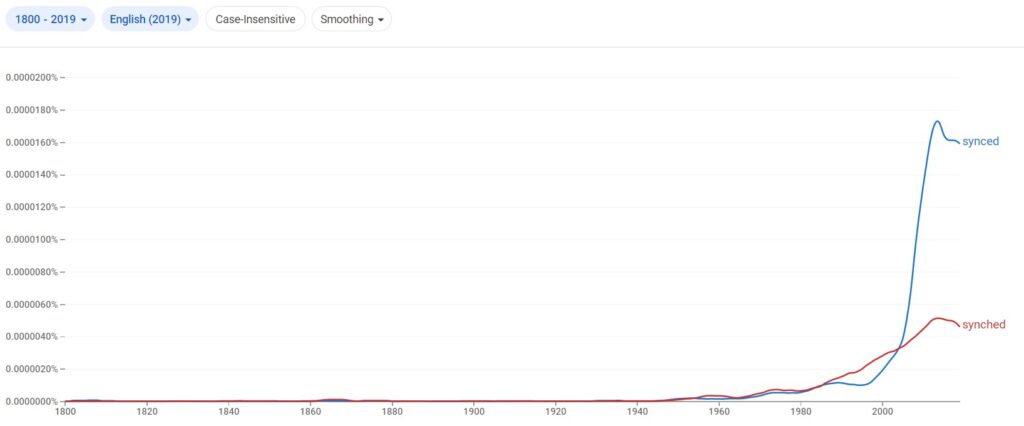
According to this graph, “synced” is still the most popular spelling variation. It just makes more sense to stick to a standardized spelling regardless of the verb form used.
- We synced the data for good measure.
- I made sure it synced before I closed the laptop.
- Have you synced the information yet?
- They synced their timings with each other.
- It’s important to stay synced, guys. Otherwise, this is all for nothing.
Is It Spelled Syncing Or Synching?
Finally, we might see “syncing” written as another verb form of “sync.” The same language and spelling rules are still used here.
“Syncing” is the more popular spelling for the present participle of “to sync.” It’s used to say that two things are happening at the same time at this exact moment.
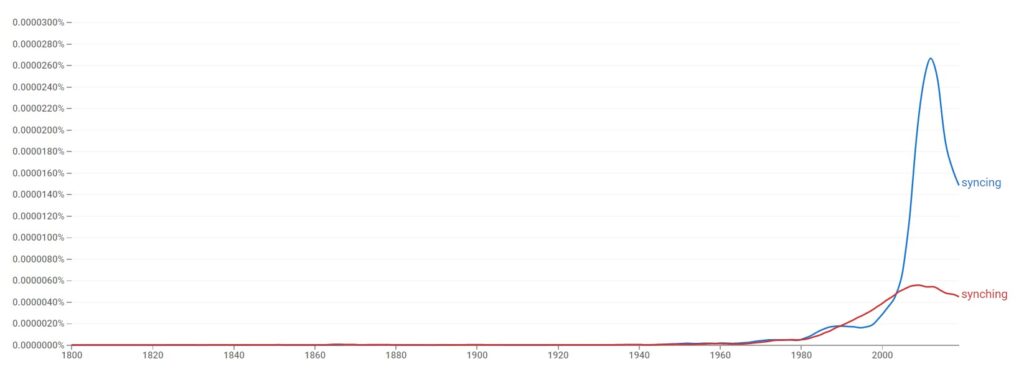
According to this graph, “syncing” is the more popular saying. However, unlike some of the other graphs that we’ve seen, it seems to be falling off in popularity quickly. “Synching” might overtake it in the common years.
- Have you been syncing the documents as I asked?
- We’ve been syncing them all day!
- You should have been syncing them for me.
- Can we stop syncing this data for a second and think about our next steps?
- Are you done with syncing the uploads?
